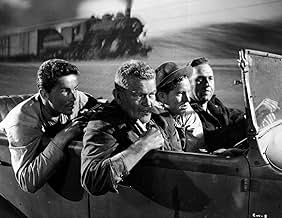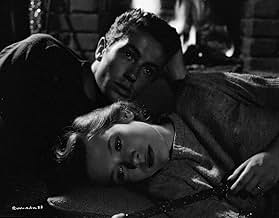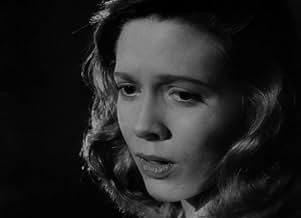VALUTAZIONE IMDb
7,4/10
10.050
LA TUA VALUTAZIONE
Un evaso, ferito durante una rapina, si innamora della donna che lo cura, ma la loro relazione sembra condannata fin dall'inizio.Un evaso, ferito durante una rapina, si innamora della donna che lo cura, ma la loro relazione sembra condannata fin dall'inizio.Un evaso, ferito durante una rapina, si innamora della donna che lo cura, ma la loro relazione sembra condannata fin dall'inizio.
- Regia
- Sceneggiatura
- Star
James Nolan
- Schreiber
- (as Jim Nolan)
Jane Allen
- Woman
- (non citato nei titoli originali)
Paul Bakanas
- Shadow
- (non citato nei titoli originali)
Recensioni in evidenza
This was the first pairing of Farley Granger and Cathy O'Donnell and it was successful enough so that the two worked together two years later in "Side Street. I heard that this movie was sort of a early "Bonnie and Clyde," and it was, but only to a degree.
Granger and O'Donnell didn't really dominate the screen until after 40 minutes but after that, it was mostly them. Frankly, I enjoyed the first 40 minutes best when Howard da Silva and J.C. Flippen shared the screen time. They were great film noir characters in this movie (and they did come back in the second half, livening up the film again.) I liked their names in here: da Silva was "Chicamaw." and Flippen was "T-Dub." In most of the second half of this movie, it went from a noir to a romance. but that's not surprising knowing the director was Nicholas Ray.
This is the best I've ever seen O'Donnell, who never impressed me much but she's impressive here with a fine performance and a nice '40s look to her. She had a strange character name, too: "Keechie." Granger ("Arthur Bowers") does a nice job, too. For an uneducated thug, he sure comes across as a really nice guy. It's kinda of weird. He reminded me of John Dall in "Gun Crazy" (1950). Some of the camera-work also reminded me of "Gun Crazy."
However, one major detail should be noted: unlike "Gun Crazy" and "Bonnie & Clyde," the two lovers in this movie did NOT rob banks together. O'Donnell's character never gets involved in any crime, so comparing this film to those doesn't really fit. Most of "Keechie's" time is spent living in a remote cabin lodge, and suggesting periodically to her husband that he go straight - a far cry from the women Peggy Cummins and Faye Dunaway played.
Like a lot of good film noirs, this also has some very good supporting actors who play weird people, and say weird things. Some of the dialogue in this movie is fascinating because it's so odd. One example is the guy who marries the couple for $20. Another is Keechie's father.
This is a odd little "B" noir/melodrama and definitely one that film noir fans should check out. Romantics will like it, too. I'm glad it is now available on disc, as part of the Film Noir Classics Collection Volume 4.
Granger and O'Donnell didn't really dominate the screen until after 40 minutes but after that, it was mostly them. Frankly, I enjoyed the first 40 minutes best when Howard da Silva and J.C. Flippen shared the screen time. They were great film noir characters in this movie (and they did come back in the second half, livening up the film again.) I liked their names in here: da Silva was "Chicamaw." and Flippen was "T-Dub." In most of the second half of this movie, it went from a noir to a romance. but that's not surprising knowing the director was Nicholas Ray.
This is the best I've ever seen O'Donnell, who never impressed me much but she's impressive here with a fine performance and a nice '40s look to her. She had a strange character name, too: "Keechie." Granger ("Arthur Bowers") does a nice job, too. For an uneducated thug, he sure comes across as a really nice guy. It's kinda of weird. He reminded me of John Dall in "Gun Crazy" (1950). Some of the camera-work also reminded me of "Gun Crazy."
However, one major detail should be noted: unlike "Gun Crazy" and "Bonnie & Clyde," the two lovers in this movie did NOT rob banks together. O'Donnell's character never gets involved in any crime, so comparing this film to those doesn't really fit. Most of "Keechie's" time is spent living in a remote cabin lodge, and suggesting periodically to her husband that he go straight - a far cry from the women Peggy Cummins and Faye Dunaway played.
Like a lot of good film noirs, this also has some very good supporting actors who play weird people, and say weird things. Some of the dialogue in this movie is fascinating because it's so odd. One example is the guy who marries the couple for $20. Another is Keechie's father.
This is a odd little "B" noir/melodrama and definitely one that film noir fans should check out. Romantics will like it, too. I'm glad it is now available on disc, as part of the Film Noir Classics Collection Volume 4.
Nicholas Ray's first film is a fascinating, enveloping example of a filmmaker getting as much as he can out of so little. His film was made under the radar at RKO, despite having John Houseman as a producer. While also having a cast of really unknowns, he also uses it to his advantage to tell a small story very well. It's close to being one of the more 'text-book' examples, in the story's core, in the history of B-noir (film-noir that didn't get the hype of The Big Sleep or Out of the Past, star vehicles as much as unique thrillers). Bowie (Farley Granger, soon to be a Hitchcock stock-player) escapes from jail with the help of a couple of bank robbers who make him, as they say, "an investment." He meets a girl, Keechie (Cathy O'Donnell), daughter of a farmer they pass by, and he becomes friends with her, so to speak. She agrees to leave town with him and they also decide, almost on a whim, to get married (for twenty bucks no less). But soon, very soon, fall in love, however, despite the checkered and now notorious past catching up to Bowie.
Obviously, if you're looking for stellar, "method" acting, look elsewhere in the main performances. But they do have enough of a pull in their chemistry on screen- sometimes rough and spelling of their doomed relationship, other times tragically tender- to back up the best aspects to the film. The true pleasures in seeing They Live By Night are the details that Ray lays in the scenes, bits of life probably taken from the book the movie's based on. Godard once proclaimed that Ray "IS cinema". If this statement does hold validity to a degree, it shows for certain even in Ray's debut in the scenes with the secondary platers. Such as the wedding scene, or in general with the dialog in the script (i.e. "Between him and the chicken, I'd bet on the chicken", or "I'm the black sheep" "the only thing black about you are your eyelashes), or even with the strengths in Ray's camera as a simple storyteller. In a sense this cuts right to the chase with the theme of doomed youth, years before Rebel Without a Cause yet with the given desperation of the noir films.
While generally less seen than Ray's other films (though more attributable to being less available on video), it's likely one of his best; a powerful mix of the bittersweet tale of a criminal and his love that would decades later meld with other crime-film elements into a work like True Romance.
Obviously, if you're looking for stellar, "method" acting, look elsewhere in the main performances. But they do have enough of a pull in their chemistry on screen- sometimes rough and spelling of their doomed relationship, other times tragically tender- to back up the best aspects to the film. The true pleasures in seeing They Live By Night are the details that Ray lays in the scenes, bits of life probably taken from the book the movie's based on. Godard once proclaimed that Ray "IS cinema". If this statement does hold validity to a degree, it shows for certain even in Ray's debut in the scenes with the secondary platers. Such as the wedding scene, or in general with the dialog in the script (i.e. "Between him and the chicken, I'd bet on the chicken", or "I'm the black sheep" "the only thing black about you are your eyelashes), or even with the strengths in Ray's camera as a simple storyteller. In a sense this cuts right to the chase with the theme of doomed youth, years before Rebel Without a Cause yet with the given desperation of the noir films.
While generally less seen than Ray's other films (though more attributable to being less available on video), it's likely one of his best; a powerful mix of the bittersweet tale of a criminal and his love that would decades later meld with other crime-film elements into a work like True Romance.
Farley Granger plays Bowie, a young con who escapes from the pen with two hardened criminals, Chicamaw and T-Dub played respectively by Howard Da Silva and Jay C Flippen in They Live By Night, an aptly titled film if there ever was one. Da Silva and Flippen are both terrific here, as is Cathy O'Donnel as Keechie, Bowie's equally young girlfriend. The movie revolves around the relationship between them and their efforts to get away from the life of crime that is always a few steps behind them and also to try living like normal people, during the day, instead of at night, like their criminal associates. This was Nicholas Ray's first film as a director and it certainly was a worthy effort, as it has fine performances throughout, especially O'Donnels. As the film comes to a close, you can pretty well figure out the ending, but that doesn't detract from its potency, as they are let down by one of their own, blackmailed it seems by the cops.
This is a very good film noir movie with excellent performances from the leads Farley Granger (of Hitchcock's "Rope" and "Strangers on a Train" and another great film noir movie "The Edge of Doom") and Cathy O'Donnell, whom I have not seen in any other role. Howard Da Silva also gives an excellent performance as a "one-eyed lush" of a gangster. I saw this movie as a teenager when it first came out and had not seen it since until recently, but I still think it holds up well as a movie well worth watching. Farley Granger, who tired of being cast as a "pretty boy" in trouble with the law and sought his fortunes elsewhere, in Europe, was a big loss to American movies.
Nicholas Ray is mostly known for his work, "Rebel WIthout a Cause", but his first work, a dazzling, moving (if sentimental) film noir, is far better. Unjustly out-of-print, "They Live By Night" may have its minor flaws, but the stark, beautiful camerawork, stolid dialogue and (perhaps above all) exquisite performances make up for it. It has none of the often phony emotions and annoying characters that are found in "Rebel Without a Cause."
Bowie, the innocent, sympathetic outlaw hero of "They Live By Night" is a wonderfully drawn. By no means is he the cliched nice-guy-in-a-bad-situation; though essentially good-hearted, he can be frighteningly callous at times. Farley Granger, working with excellent direction, he gives us glimpses of a violent yet passionate nature, struggling against the condemnation of society. Cathy O'Donnell is also entrancingly tender, yet we can vaguely see that her character is trapped in a hopeless relationship with Bowie. She is also sadly obscure, which plainly has nothing to do with her talent.
The one significant fault of this film is over-restraint. At times, Ray's understated direction can be extremely effective, such as when he is dealing with violence. But at other times the characters' (and especially Keechie's) emotions are so tightly controlled that some of the impact on the audience is lost. Still, despite a few faults, "They Live By Night" is a wonderful film, and if ever you can find it, sell your hair but GET IT!!!
Bowie, the innocent, sympathetic outlaw hero of "They Live By Night" is a wonderfully drawn. By no means is he the cliched nice-guy-in-a-bad-situation; though essentially good-hearted, he can be frighteningly callous at times. Farley Granger, working with excellent direction, he gives us glimpses of a violent yet passionate nature, struggling against the condemnation of society. Cathy O'Donnell is also entrancingly tender, yet we can vaguely see that her character is trapped in a hopeless relationship with Bowie. She is also sadly obscure, which plainly has nothing to do with her talent.
The one significant fault of this film is over-restraint. At times, Ray's understated direction can be extremely effective, such as when he is dealing with violence. But at other times the characters' (and especially Keechie's) emotions are so tightly controlled that some of the impact on the audience is lost. Still, despite a few faults, "They Live By Night" is a wonderful film, and if ever you can find it, sell your hair but GET IT!!!
Lo sapevi?
- QuizThe opening helicopter shot was the first scene that Nicholas Ray ever directed.
- BlooperThe new Cadillac is seen to be covered with a tarpaulin. When the camera swings back to it, the tarpaulin has vanished.
- Curiosità sui creditiOpening credits: This boy . . . and this girl . . . were never properly introduced to the world we live in . . . To tell their story . . .
- ConnessioniEdited into Histoire(s) du cinéma: Le contrôle de l'univers (1999)
- Colonne sonoreYour Red Wagon
by Richard M. Jones, Don Raye and Gene de Paul (as Gene DePaul)
Performed by Marie Bryant (uncredited)
[Sung by club performer]
I più visti
Accedi per valutare e creare un elenco di titoli salvati per ottenere consigli personalizzati
- How long is They Live by Night?Powered by Alexa
Dettagli
- Data di uscita
- Paese di origine
- Lingua
- Celebre anche come
- Los amantes de la noche
- Luoghi delle riprese
- Azienda produttrice
- Vedi altri crediti dell’azienda su IMDbPro
Botteghino
- Budget
- 808.397 USD (previsto)
- Tempo di esecuzione
- 1h 35min(95 min)
- Colore
- Proporzioni
- 1.37 : 1
Contribuisci a questa pagina
Suggerisci una modifica o aggiungi i contenuti mancanti










































